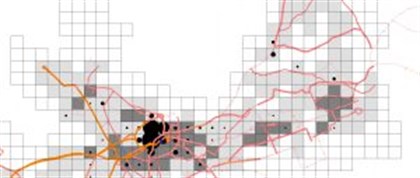Nyheter
- Januari (3)
- Februari (3)
- Mars (4)
- April (4)
- Maj (9)
- Juni (4)
- Juli (1)
- Augusti (3)
- September (4)
- Oktober (9)
- November (5)
- December (4)
- Januari (4)
- Februari (7)
- Mars (7)
- April (1)
- Maj (6)
- Juni (4)
- Juli (1)
- Augusti (2)
- September (6)
- Oktober (11)
- November (1)
- December (4)
- Januari (5)
- Februari (3)
- Mars (11)
- April (9)
- Maj (10)
- Juni (8)
- Juli (2)
- Augusti (1)
- September (7)
- Oktober (7)
- November (6)
- December (5)
- Januari (28)
- Februari (27)
- Mars (13)
- April (10)
- Maj (6)
- Juni (4)
- Juli (3)
- Augusti (5)
- September (1)
- Oktober (6)
- November (8)
- December (6)
- Januari (25)
- Februari (38)
- Mars (38)
- April (23)
- Maj (22)
- Juni (26)
- Juli (11)
- Augusti (22)
- September (78)
- Oktober (23)
- November (9)
- December (11)
Säkra Platser - Doktorandkurs - Spatial data analysis

AG3170 Spatial Data Analysis in Practice 7.5 credits
Learning outcomes
Students are trained to become users of spatial data analysis techniques. Students will gain a broad knowledge of the diversity of current approaches, which methods are at hand and examples of applications using spatial data analysis in different fields. After completing the course the students should be able to:
- identify the appropriate approaches/techniques in spatial data analysis.
- use relevant knowledge to solve spatial-related problems using real-life data sets and spatial statistical tools, including pattern identification, modeling (spatial regression analysis) and visualization.
- to analyze results of practical exercises and be able to point out challenges and advantages with those tested techniques.
- develop, interpret and critically reflect upon results of a case study using one (or more) spatial data analysis technique(s) learned during the course.
- be able to use their new skills in spatial data techniques and communicating them to an audience (written & orally).
Special feature
The SDAP 2019 course features two prominent scholars:
- Fulbright visiting scholar Dr Ned Levine, USA, CrimeStat IV (version 4.02).
- Prof Bin Jang, Professor at the Department of Technology and Built Environment of University of Gävle, Sweden.Head teacher: Vania Ceccato. The course will also involve teachers from other departments at KTH and/or other universities.
Course fee
SEK 8000 paid by 18 March 2019
Maximum number of students
25 students.
Register your interest
Info about the course, contact: vania.ceccato@abe.kth.se
For updates, contact: runbjo@kth.se
Requirements
Doctoral students from any relevant subject area are eligible to take this course. However, having knowledge in GIS and/or basic statistics is an advantage.
A portable computer is needed and installation of software according instructions for execution of all lab exercises is necessary.
All lectures require pre-reading. Attending lectures and executing lab exercises is a must.
For more information click here!



